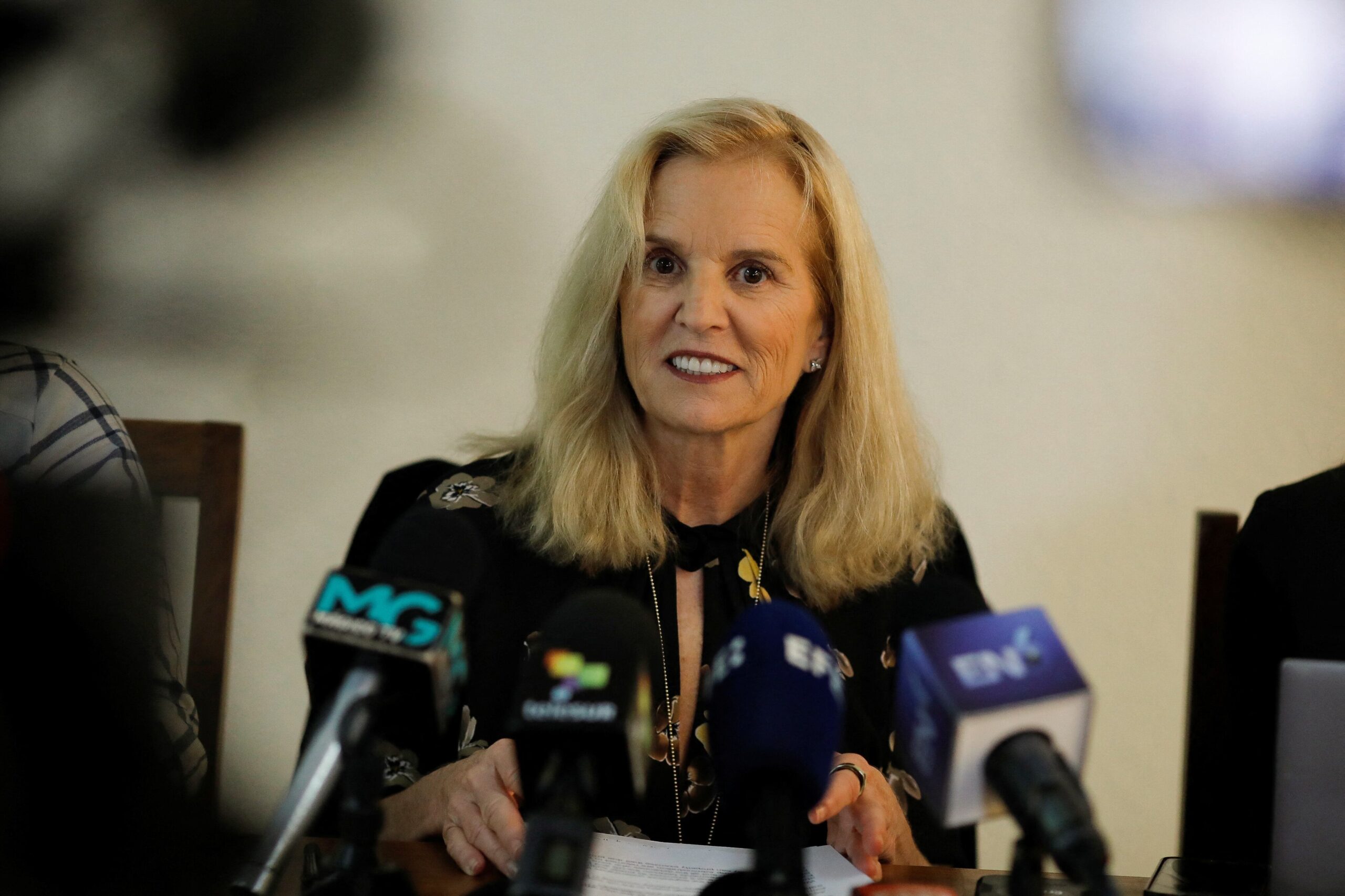The U.S.-based human rights foundation Robert F. Kennedy Human Rights will inform the United Nations system and the Inter-American Commission on Human Rights (IACHR) about the human rights situation in El Salvador within the context of a state of exception implemented against gangs.
This was stated Monday in San Salvador by the foundation’s president, Kerry Kennedy, who is visiting the Central American country with a team of experts to assess the status of the issue.
The activist and lawyer explained at a press conference held at the headquarters of the non-governmental organization Cristosal that during her visit, she has met with representatives from civil society, media outlets, and human rights organizations.
She detailed that they had the opportunity to interview people who had been detained after being arrested during the state of exception, and that “many of them told us that the conditions in the prisons are inhumane.”
“Thousands of other people continue to be held in inhumane conditions and are at risk of harm,” she said.
Robert F. Kennedy’s daughter asserted that she “will not remain silent” regarding “the systematic commission of serious human rights violations in El Salvador,” and “we will ensure we take these stories with us and show the world what we have witnessed.”
“We have consistently heard that the vast majority of people deprived of their liberty under the state of exception and held in detention centers across the country are innocent” and that “their only crime seems to be that they are poor and vulnerable,” she indicated.
Kennedy and her working group traveled to La Esperanza prison – known as Mariona and located near the capital, San Salvador – to learn about the situation of the detainees but were denied access, according to their statements.
El Salvador’s Legislative Assembly, dominated by the ruling Nuevas Ideas (NI) party, approved the 37th extension of a state of exception on April 1st. The measure, implemented three years ago to “combat” gangs, was extended due to “the continued existence of terrorist structures” in the country.
A group of humanitarian organizations has received reports from at least 6,889 victims of human rights violations under the state of exception, with arbitrary detention accounting for 98% of the reports. Over 390 deaths of people in state custody have been recorded.
The state of exception suspends constitutional guarantees such as the detainees’ right to legal defense, the inviolability of telecommunications, and the maximum administrative detention period of 3 days, which is extended to 15.
Fundación estadounidense Robert F. Kennedy informará a la ONU y a la CIDH sobre la situación de derechos humanos en El Salvador
La fundación pro derechos humanos Robert F. Kennedy, de Estados Unidos, informará al sistema de las Naciones Unidas y a la Comisión Interamericana de Derechos Humanos (CIDH) sobre la situación de derechos humanos en El Salvador en el contexto de un régimen de excepción implementado contra las pandillas.
Así lo señaló este lunes en San Salvador la presidenta de la fundación, Kerry Kennedy, que se encuentra de visita en el país centroamericano junto con un equipo de expertos para conocer el estado del tema.
La activista y abogada expuso en una conferencia de prensa, en la sede de la organización no gubernamental Cristosal, que durante su visita se ha reunido con representantes de la sociedad civil, de medios de comunicación y de organizaciones de derechos humanos.
Detalló que tuvieron la oportunidad de entrevistar a personas que estuvieron detenidas tras ser arrestadas durante el régimen de excepción, y que «muchas de ellas nos externaron que las condiciones en las cárceles son inhumanas».
«Miles de otras personas continúan recluidas en condiciones inhumanas y corren peligro de sufrir daños», dijo.
La hija de Robert F. Kennedy aseguró que «no permanecerá callada» ante «la comisión sistemática de graves violaciones a derechos humanos en El Salvador», y «nos aseguraremos de llevarnos estas historias con nosotras y mostrar al mundo lo que hemos presenciado».
«Hemos escuchado, constantemente, que la gran mayoría de personas privadas de libertad en el marco del estado de excepción y recluidas en centros detención de todo el país son inocentes» y que «su único delito parecer ser que son pobres y vulnerables», indicó.
Kennedy y su grupo de trabajo se trasladaron a la prisión La Esperanza -conocida como Mariona y cercana a la capital San Salvador- para conocer la situación de las personas detenidas pero no se les permitió el acceso, según señalaron.
La Asamblea Legislativa de El Salvador, dominada por el partido oficialista Nuevas Ideas (NI), aprobó el pasado 1 de abril la prórroga 37 de un régimen de excepción, implementado desde hace tres años para «combatir» a las pandillas, por «la aún existencia de estructuras terroristas» en el país.
Un grupo de organizaciones humanitarias ha recibido denuncias de al menos 6.889 víctimas de violaciones de derechos humanos bajo el régimen de excepción, con la detención arbitraria con el 98 % de las denuncias, y se registran más de 390 muertes de personas bajo custodia de agentes del Estado.
El régimen suspende garantías constitucionales como el derecho a la defensa de los detenidos, la inviolabilidad de las telecomunicaciones y la detención administrativa máxima de 3 días, que pasa a 15.

